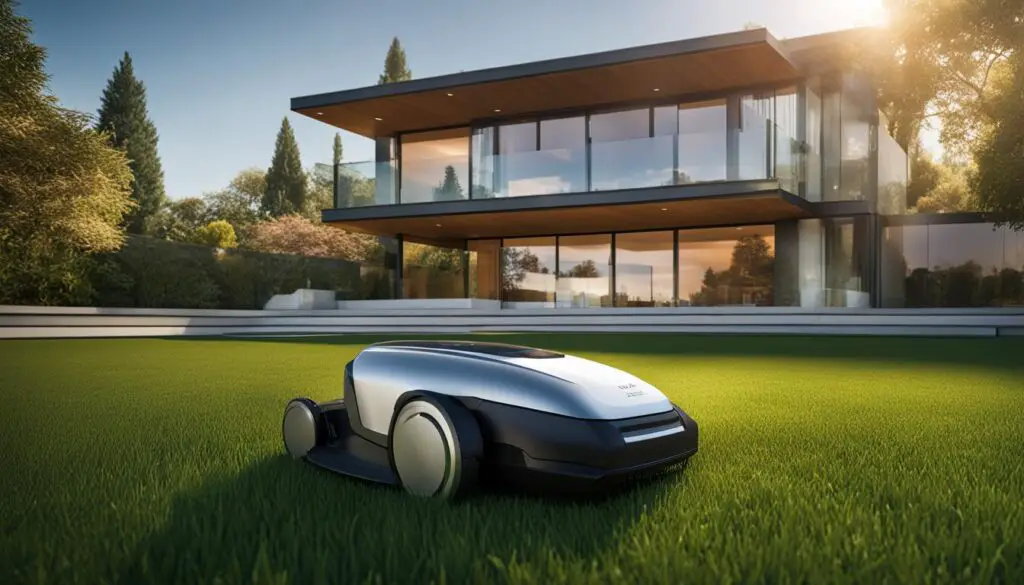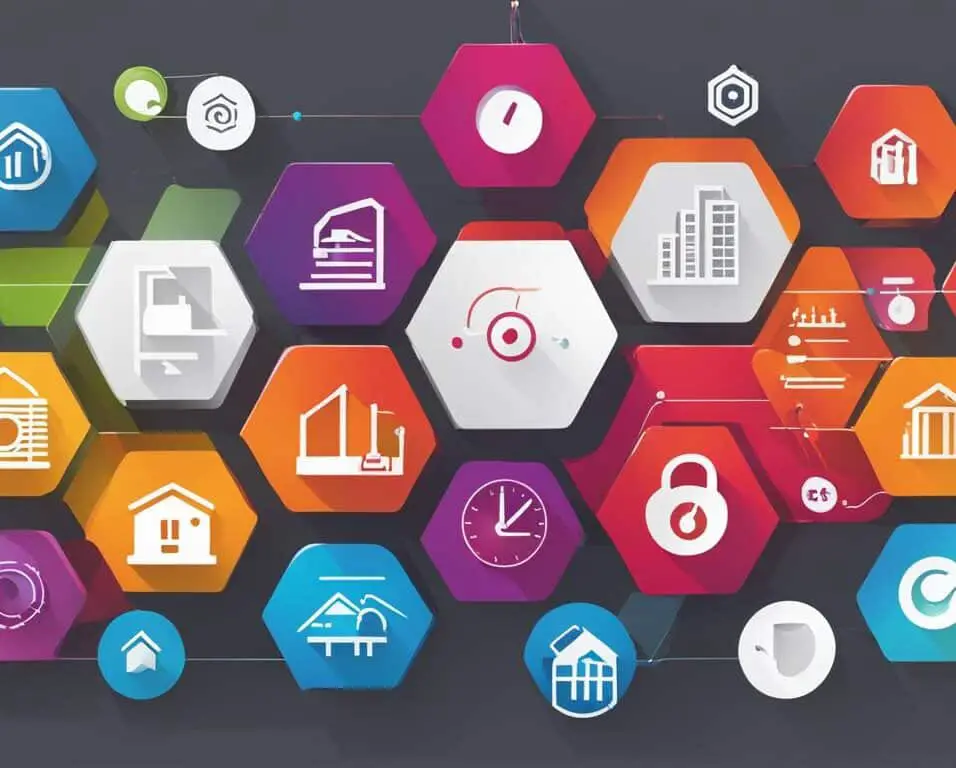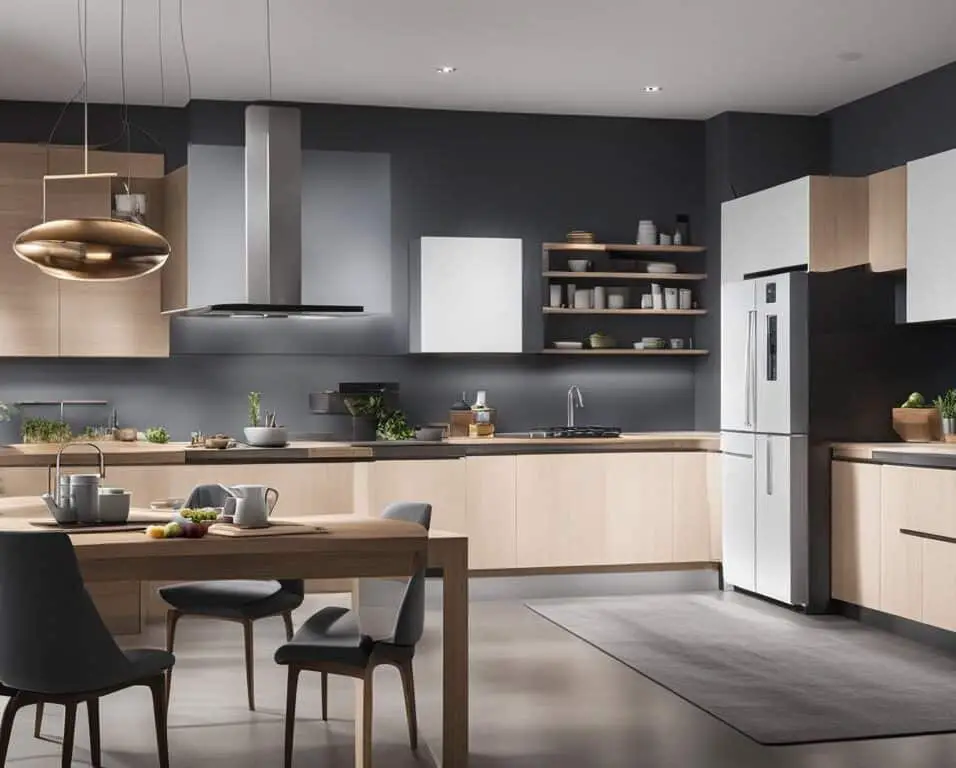The Impact of AI on Modern Home Automation
Welcome to my article on the impact of AI on modern home automation. In today’s technology-driven world, smart home automation has become increasingly popular, offering convenience, efficiency, and customization to homeowners. And at the forefront of this revolution is the integration of Artificial Intelligence (AI) technology into our smart homes. AI has truly transformed the way we interact with our homes, making them smarter, more intuitive, and more personalized.
With the advancements in AI technology, smart homes have become more accessible and affordable for many people. AI enables compatibility with smart devices, enhancing their efficacy and adding convenience to everyday tasks. From robotic kitchens to AI-based security surveillance, AI brings a new level of automation and intelligence to smart homes. The integration of AI in smart homes has paved the way for a more connected and tailored living experience for homeowners, significantly improving their quality of life.
Throughout this article, we will explore the benefits of AI in smart homes, including the convenience of AI-enabled devices, the efficiency of AI-powered systems, and the enhanced security AI provides. We will also delve into real-life examples of how AI is transforming smart home automation and shaping the future of technology.
Key Takeaways:
- AI technology has revolutionized smart home automation, making homes more connected, efficient, and personalized.
- AI-enabled devices offer convenience, efficiency, and enhanced security for homeowners.
- Real-life examples showcase the diverse applications of AI in smart homes, including smart assistants, energy management systems, and personalized lighting solutions.
- The integration of AI in smart homes is shaping the future of technology and transforming the way we live.
- Smart home automation powered by AI creates a more intuitive, responsive, and customized living experience for homeowners.
Benefits of AI in Smart Homes
AI brings a multitude of benefits to smart homes. By reducing human involvement in implementing various tasks, AI enhances convenience and frees up time for homeowners. AI-enabled devices, such as robotic kitchens, can prepare freshly cooked meals with minimal effort, providing convenience for busy individuals.
With AI-powered robotic kitchens, homeowners can enjoy delicious meals without spending excessive time in the kitchen. These smart appliances can follow recipes accurately, measure ingredients precisely, and cook dishes to perfection. The convenience of having a robotic kitchen eliminates the need for constant monitoring and allows homeowners to focus on other important tasks.
AI also plays a crucial role in improving the security of smart homes. Through advanced monitoring, collection of information, and timely transmission of alerts, AI systems can detect and prevent potential security breaches.
The integration of AI in smart homes extends beyond the kitchen and security systems. For instance, AI-based windows and locks add an extra layer of security by keeping off unauthorized individuals and adapting to homeowners’ preferences.
AI-based windows utilize data such as outside temperatures and air quality to automatically open and shade, optimizing thermal comfort and energy usage. These intelligent windows can also detect attempts to break in and alert homeowners.
Similarly, AI-based locks eliminate the need for physical keys and provide personalized access control. These locks use facial recognition or fingerprint scanning to grant entry only to authorized individuals and capture images of everyone entering the home.
Moreover, AI technology can assist smart homeowners in other areas, such as reducing water consumption in gardens, optimizing the quality and output of produce, and automating lawn maintenance tasks.
AI-enabled devices like autonomous lawn mowers use sensors and AI algorithms to navigate and trim grass within set boundaries, ensuring a well-maintained lawn with minimal human effort.
Overall, the benefits of AI in smart homes encompass convenience, efficiency, and security. AI-enabled devices and systems enhance everyday tasks, optimize resource utilization, and provide a personalized living experience for homeowners.
Benefits of AI in Smart Homes
| Benefit | Description |
|---|---|
| Convenience | Reduces the effort and time required for various tasks, such as cooking and lawn maintenance |
| Efficiency | Optimizes resource usage, such as water in gardens and energy in home automation systems |
| Security | Enhances home security through AI-based monitoring, surveillance, windows, and locks |
AI Enabled Robotic Kitchen
The use of AI robots in the kitchen is a rising trend in smart homes. AI-enabled robotic kitchens offer convenience and efficiency in meal preparation. They can cook a variety of recipes to suit any dietary requirement and offer reliable procedures from international chefs. Robotic kitchens have touch screens that allow users to choose recipes and track the progress of the robot. These robots can perform tasks similar to those of a human cook, such as picking ingredients, using kitchen appliances, adjusting temperature, and cleaning up after themselves. The robotic kitchen is available in various styles and finishes that match the home decor, making it a seamless addition to any smart home.
Benefits of AI Enabled Robotic Kitchen:
- Convenience: AI robots in the kitchen simplify meal preparation and eliminate the need for extensive manual labor.
- Efficiency: Robotic kitchens can perform multiple tasks simultaneously, saving time and effort for homeowners.
- Customization: With a wide range of recipes and chef-designed procedures, robotic kitchens cater to individual dietary preferences and cooking styles.
- Seamless Integration: The sleek design and customizable finishes of robotic kitchens complement any smart home decor.
- Data-driven Precision: AI algorithms ensure precise ingredient measurements, temperature control, and cooking times for consistent results.
“The AI-enabled robotic kitchen has transformed the way I cook. It’s incredibly convenient, allowing me to prepare delicious meals without spending hours in the kitchen. Plus, it’s fascinating to watch the robot effortlessly handle every task!” – Sarah Thompson, Smart Home Enthusiast
Comparison Table: AI Enabled Robotic Kitchen Models
| Model | Features | Price Range | Availability |
|---|---|---|---|
| AIRobot Chef Master | Touchscreen interface, recipe library, self-cleaning | $2,000 – $2,500 | Online and select retail stores |
| SmartCook KitchenBot | Voice command integration, personalized cooking recommendations | $2,500 – $3,000 | Online only |
| CulinaryAI Pro | AI-assisted meal planning, dietary restriction support | $3,000 – $3,500 | High-end appliance retailers |
AI-based Windows and Locks
AI-based windows and locks play a crucial role in enhancing the security of smart homes. Through the integration of AI technology, these advanced systems provide homeowners with convenience, peace of mind, and improved energy efficiency.
AI-based windows utilize real-time data on outside temperatures and air quality to automatically open and shade accordingly. This not only creates a comfortable indoor environment but also optimizes energy usage by minimizing the need for heating or cooling. Additionally, AI-based windows employ a persona-based approach, learning and adjusting to the historical preferences of the occupants. This personalized adaptation ensures a consistent and pleasant living experience, even when no one is home.
Furthermore, AI-based windows are equipped with sophisticated sensors that can detect any attempts to break in. These windows promptly alert homeowners and provide an extra layer of security to prevent unauthorized access. With AI-based windows, homeowners can have confidence in the safety and protection of their smart homes.
Similarly, AI-based locks revolutionize home security by eliminating the need for physical keys. Instead, access to the home is granted only to authorized individuals through a seamless and secure authentication process. AI-based locks are equipped with advanced features such as facial recognition and fingerprint scanning, ensuring that only trusted individuals can enter the premises. Moreover, these locks capture images of everyone entering the home, providing a visual record for additional security measures.

| Benefits of AI-based Windows | Benefits of AI-based Locks |
|---|---|
| 1. Enhanced thermal comfort | 1. Elimination of physical keys |
| 2. Optimization of energy usage | 2. Granting access to authorized individuals only |
| 3. Personalized adaptation to occupant preferences | 3. Image capture for security purposes |
| 4. Detection and alerting of break-in attempts | 4. Seamless and secure authentication process |
With AI-based windows and locks, homeowners can enjoy the convenience of automated security measures while ensuring the utmost protection for their smart homes. The seamless integration of AI technology enhances the overall smart home experience, making it more efficient, secure, and convenient.
Autonomous Lawn Mowers
Autonomous lawn mowers are revolutionizing smart home lawn care, offering convenience and efficiency for homeowners. These AI-powered devices utilize advanced sensors and a perimeter wire to detect and trim grass within predetermined boundaries. With their ability to navigate obstacles and return to their charging docks autonomously, these mowers simplify lawn maintenance tasks and save valuable time and effort.
Equipped with self-docking capabilities, autonomous mowers can effortlessly trim large areas of grass with minimal human interaction. This feature ensures that homeowners can enjoy a well-manicured lawn without the hassle of manual labor. Additionally, these mowers incorporate security measures to protect themselves against theft, including triggering alarms and requiring a custom PIN for reactivation.
By automating lawn care, autonomous mowers provide homeowners with a convenient and efficient solution for maintaining their outdoor spaces. Whether it’s a large garden or a small backyard, these AI-powered devices offer a hands-free approach to lawn care, allowing homeowners to focus on other important tasks. With the added benefit of secure and autonomous operation, autonomous lawn mowers are an essential component of any smart home lawn care system.

The Benefits of Autonomous Lawn Mowers
- Convenience: Autonomous lawn mowers eliminate the need for manual grass cutting, saving homeowners time and effort.
- Efficiency: These AI-powered devices can trim large areas of grass efficiently, ensuring a well-maintained lawn with minimal human intervention.
- Quiet Operation: Unlike traditional lawn mowers, autonomous mowers operate quietly, minimizing disruptions and creating a peaceful environment.
- Safety Features: Autonomous mowers are equipped with safety features such as sensors to detect obstacles and automatically shut off when lifted or tilted.
- Environmentally Friendly: By using electric power, autonomous mowers reduce carbon emissions and contribute to a greener environment.
“Autonomous lawn mowers are a game-changer in the world of smart home lawn care. With their advanced AI technology and autonomous operation, homeowners can enjoy a well-maintained lawn without the hassle of manual labor.”
Autonomous Home Monitoring
Autonomous home monitoring is a crucial aspect of smart home security, and AI technology has elevated surveillance to new heights. AI-powered cameras and sensors play a pivotal role in detecting unusual activity, triggering immediate alerts, and capturing high-definition images and videos of potential intruders. These devices are interconnected and fully autonomous, enabling homeowners to monitor their properties remotely, even when they are away. In addition to traditional monitoring methods, AI-powered surveillance drones can be deployed to capture real-time images and record video footage upon detecting suspicious activity.
The integration of AI in home monitoring systems significantly enhances the effectiveness and efficiency of security measures, providing homeowners with peace of mind. With AI-powered surveillance, homeowners can rely on intelligent algorithms to accurately analyze and identify potential threats, reducing false alarms while ensuring that no genuine threats go unnoticed.
“Autonomous home monitoring powered by AI technology not only provides a heightened sense of security but also offers convenience. Homeowners can have complete control over their home security, monitoring every corner of their property at any time, from anywhere. The peace of mind that comes with knowing that your home is protected is truly invaluable.”
Key Features of Autonomous Home Monitoring:
- Real-time detection of unusual activity
- Immediate triggering of alerts for prompt action
- High-definition image and video capture of potential intruders
- Interconnected and fully autonomous devices for remote monitoring
- Deployment of AI-powered surveillance drones for additional coverage
The convenience offered by autonomous home monitoring cannot be overstated. Homeowners can effortlessly keep an eye on their properties, whether they are at work, on vacation, or simply in another room of their home. The integration of AI technology brings unparalleled convenience, efficiency, and peace of mind to smart home security.
By embracing autonomous home monitoring, homeowners can take advantage of the latest advancements in AI-powered surveillance, ensuring the safety and security of their smart homes.
AI in Smart Home Automation – Real-Life Examples
AI is revolutionizing the world of smart home automation through real-life examples that showcase the power and versatility of this technology. From smart assistants to energy management systems, AI is transforming the way we interact with our homes, making them more connected, efficient, and secure.
Smart Assistants: Simplifying Home Automation
Smart assistants like Amazon Alexa and Google Assistant have become indispensable companions in the modern smart home. Through voice commands, users can control and automate various devices, such as lighting, thermostats, and entertainment systems. The intuitive nature of smart assistants makes it easier than ever to manage and customize the different aspects of home automation.
Energy Management: Optimizing Efficiency
AI-powered devices like smart thermostats and lighting systems bring enhanced energy management capabilities to smart homes. These devices utilize AI algorithms to learn user preferences and adjust settings accordingly, optimizing energy usage and reducing utility bills. Through real-time monitoring and automation, AI enables homeowners to create personalized schedules, adapt to changing environmental conditions, and make informed decisions to improve energy efficiency.
Security: Protecting What Matters
AI technology plays a crucial role in improving the security and safety of smart homes. Surveillance systems equipped with AI-powered cameras and sensors can detect suspicious activities, trigger alerts, and provide 24/7 monitoring. Smart doorbells with facial recognition and voice recognition features enhance access control, while smoke detectors equipped with AI algorithms can detect and differentiate between different types of smoke, providing early warnings in the event of a fire.
Personalized Lighting: Setting the Mood
AI-driven lighting systems offer a personalized lighting experience that adapts to users’ preferences and daily activities. These systems can analyze patterns and behaviors to create custom lighting scenes, adjusting brightness, color temperature, and ambiance to suit different moods and occasions. By enhancing comfort and ambiance, personalized lighting solutions make smart homes more inviting and enjoyable.
“AI-powered devices and systems offer personalized experiences, optimize energy usage, enhance security, and provide convenience in daily tasks.”
These real-life examples highlight the immense potential of AI in smart home automation. By leveraging AI technology, homeowners can create intelligent and responsive living spaces that cater to their specific needs and preferences. Whether it’s simplifying daily tasks with smart assistants, optimizing energy usage with AI-powered devices, enhancing security and safety, or setting the perfect lighting ambiance, AI is transforming the way we live in our homes.
| Examples | Key Features |
|---|---|
| Smart Assistants | Voice-controlled automation, integration with smart devices |
| Energy Management | Optimized energy usage, personalized scheduling, real-time monitoring |
| Security Systems | AI-powered cameras, facial and voice recognition, intelligent alerts |
| Personalized Lighting | Adaptive lighting scenes, customizable brightness and color temperature |
Conclusion
Smart home automation powered by AI technology has revolutionized the way we interact with our homes. The integration of AI brings numerous benefits, including convenience, efficiency, and security, to homeowners. With AI-powered devices and systems, homes offer personalized experiences and optimize energy usage, enhancing the overall living experience.
The benefits of AI in smart homes are immense. AI technology enables homes to become more intuitive, responsive, and customized to individual preferences. From AI-enabled robotic kitchens that prepare delicious meals to autonomous lawn mowers that maintain a well-manicured lawn, AI-powered devices offer convenience and efficiency in our daily tasks. AI-based windows and locks enhance home security, providing peace of mind for homeowners.
The future of smart homes powered by AI technology holds even more exciting possibilities. As AI continues to advance, we can expect further enhancements in the automation and intelligence of our homes. Future trends such as AI-powered personal assistants, energy management systems, and even more advanced security measures are expected to transform the way we live.
In summary, smart home automation empowered by AI technology is shaping the future of technology and transforming the way we live. With benefits ranging from convenience and efficiency to enhanced security, AI-enabled smart homes offer a personalized and connected living experience. As the integration of AI in smart homes continues to evolve, the possibilities are endless, and the future looks brighter than ever.
FAQ
What is smart home automation?
Smart home automation refers to the integration of technology, specifically artificial intelligence (AI), into various aspects of a home to enhance convenience, efficiency, and security. It involves the use of AI-powered devices and systems to automate tasks, control devices through voice commands, optimize energy usage, and enhance security measures.
How does AI impact smart home automation?
AI has revolutionized smart home automation by making homes smarter, more efficient, and more connected. With AI technology, smart homes can learn and adapt to individual preferences, automate tasks, and provide personalized experiences. AI enables compatibility with smart devices, enhancing their efficacy and adding convenience to everyday tasks.
What are the benefits of AI in smart homes?
AI brings a multitude of benefits to smart homes. It enhances convenience by reducing human involvement in implementing various tasks, such as cooking and lawn care. AI-powered devices, such as robotic kitchens and autonomous lawn mowers, offer convenience and efficiency. AI also improves security through surveillance cameras, AI-based windows, and locks. Additionally, AI enables personalized experiences and energy optimization in smart homes.
How does an AI-enabled robotic kitchen work?
An AI-enabled robotic kitchen is a smart device that can automate meal preparation. It can cook a variety of recipes, pick ingredients, adjust temperature, and clean up after itself. Users can choose recipes and track the progress of the robot through touch screens. Robotic kitchens offer convenience and efficiency, making meal preparation effortless for busy individuals.
What are AI-based windows and locks?
AI-based windows and locks are smart home security features that use AI technology to enhance convenience and safety. AI-based windows can open and shade according to outside temperatures and air quality, providing thermal comfort while optimizing energy usage. They can also detect and alert homeowners of any attempts to break in. AI-based locks eliminate the need for physical keys and grant access only to authorized individuals, capturing images of everyone entering the home.
How do autonomous lawn mowers work?
Autonomous lawn mowers are AI-powered devices that use sensors and a perimeter wire to detect and trim grass within set boundaries. They can navigate obstacles and return to their charging docks, making lawn maintenance effortless for homeowners. Autonomous mowers are self-docking and can trim large areas of grass with minimal human interaction, saving time and effort while ensuring a well-maintained lawn.
What is autonomous home monitoring?
Autonomous home monitoring is a smart home security feature powered by AI technology. It involves the use of AI-powered cameras, sensors, and surveillance drones to detect unusual activity, trigger alerts, and record high-definition images and videos of potential intruders. These devices are interconnected and fully autonomous, allowing homeowners to monitor their homes remotely, providing peace of mind.
What are some real-life examples of AI in smart home automation?
Real-life examples of AI in smart home automation include smart assistants like Amazon Alexa and Google Assistant, which allow users to control and automate devices through voice commands. AI-powered devices such as smart thermostats, lighting systems, AI-powered doorbells, and smoke detectors optimize energy usage, improve security, and enhance convenience. Personalized lighting solutions adapt to users’ preferences and daily activities.
How is AI transforming smart home automation?
AI technology has revolutionized the way we interact with our homes through smart home automation. It brings numerous benefits, including convenience, efficiency, and security, to homeowners. AI-powered devices and systems offer personalized experiences, optimize energy usage, enhance security, and provide convenience in daily tasks. The integration of AI in smart homes will further enhance the living experience, making homes more intuitive, responsive, and customized to individual preferences.








